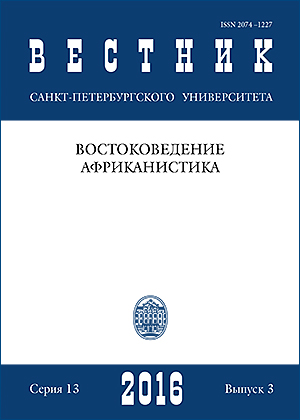The concept of “dead language” as exemplified by Hebrew
DOI:
https://doi.org/10.21638/11701/spbu13.2016.302Abstract
This paper examines the problematic concept of dead language as exemplified by the Hebrew language. The first section presents a brief history of the concept of dead language in European linguistic thought. Originating in Italy of the 15th century, the term became common in European linguistic writings during the 16th to 18th centuries as an epithet for Latin, Ancient Greek and Hebrew. During the Haskala (Jewish Enlightenment) in the 19th century it was adopted by Jewish intellectuals and was current in linguistic controversies throughout the 20th century. Sections 2 and 3 show the key role the label dead as applied to Hebrew played in wide-spread polemics on Jewish language choice in Russia during the first quarter of the 20th century (§ 2) and in the discourse about a Hebrew “revival” in Palestine at the same period (§ 3). Later works on the history of Hebrew published in the 19th and 20th centuries proposed novel conceptualizations but nevertheless followed the idea of the “deadness” of the Hebrew language of previous periods, discussed in § 4. Examples of Hebrew usage which contradict Hebrew’s functioning exclusively as a language of religion and high-level writings are provided in § 5. The last section is a humble attempt to outline a possible direction for a description of Hebrew language history, avoiding the problematic term dead language and other related terms.
Keywords:
biological metaphor in linguistics, linguistic terminology, dead language, Hebrew language “revival”, Yiddish language, diglossia, dissolution of diglossia, history of linguistics
Downloads
References
transformacija i sovremennoe sostojanie: Materjaly k meždunarodnoj konferencii. Birobidžan. 2011. Available at: http://icarp.ru/konferens/konf_2011/konf_idish_2011/Chistykov.pdf" target="_blank">http://icarp.ru/konferens/konf_2011/konf_idish_2011/Chistykov.pdf
Downloads
Published
How to Cite
Issue
Section
License
Articles of "Vestnik of Saint Petersburg University. Asian and African Studies" are open access distributed under the terms of the License Agreement with Saint Petersburg State University, which permits to the authors unrestricted distribution and self-archiving free of charge.





